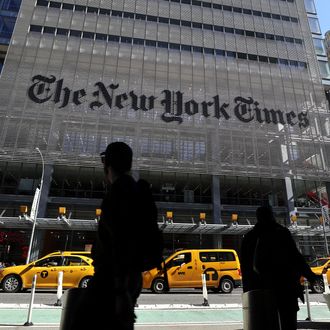
Today, New York Times honcho Dean Baquet ordered a company-wide “reset” in how his staff should think about Twitter. Mostly, he’d like them to never look at it again.
You can see why. Most of the people who work for him are very bad at being on Twitter, and their tweets truly are just not good. And then their bosses are so obsessed with Twitter too, and on edge about it. A cycle of humiliation ensues. They spend all that money on editors and then people just write stuff willy-nilly online? Whatever for?!
Twitter looms prominently for journalists because it’s how they get jobs, distribute their work, and make friends. Twitter also helps journalists feel and be seen inside a system that will otherwise make them feel invisible. (No, I’m not asking you to feel bad for them, I promise.) Reporters in general are anxious, and the structure of their workplace feeds that. At the Times in particular they are often starved for information and kept in eternal suspense about their status in the organization. (An extremely successful reporter, when I worked there, once asked me if she was in the “rubber room,” referring to the detention places New York City used to send its bad teachers. She was! She had offended a senior leader and was being iced out, but no one would tell her.)
If you get little real feedback on your value, why wouldn’t you seek it elsewhere? If you’re worried no one will know you’re alive, where else will you remind them? Twitter. Plus, sometimes the jokes are good.
There are bigger consequences. Reporters confuse their Twitter audience for the actual world. For obvious reasons (Caucasity), most of these reporters are on the joyless, scold-y White Twitter, which is the opposite of all this. And a small minority of people create most of the tweets one sees, part of a feedback loop that can diminish how journalists think about schools, work, business, and the pandemic. Twitter is where anecdotes are mistaken for data.
There’s a meme, certainly popular inside the Times, that Twitter instills some kind of self-feeding censorship. Baquet might hate this most of all; he despises fearfulness. Last month, the reporter Sarah Hepola wrote an essay for The Atlantic about her long-standing fear of what she dramatically called the “public execution chambers of social media.” She had to renounce this dread of Twitter in order to finally write freely, she said. Good for her! Her essay had some hiccups, mostly where she suggested there was some false orthodoxy or untold dimension to the Brock Turner story. Personally, I did not love it. Perhaps everyone else did but were just too afraid to tweet about it. We’ll never know.
At least, I won’t. I took the Twitter app off my phone months ago. Never felt better. Someday, with enough gumption or money, I’ll go full Selena Gomez and never go online again. Maybe I won’t be invited onto podcasts! What bliss.
I truly hate to admit when management is right. But if you can afford it, just know that logging off Twitter feels better than all the admiration of your peers. Besides, our bosses will never find us over on the actually good platforms (yes, I mean BeReal).






























